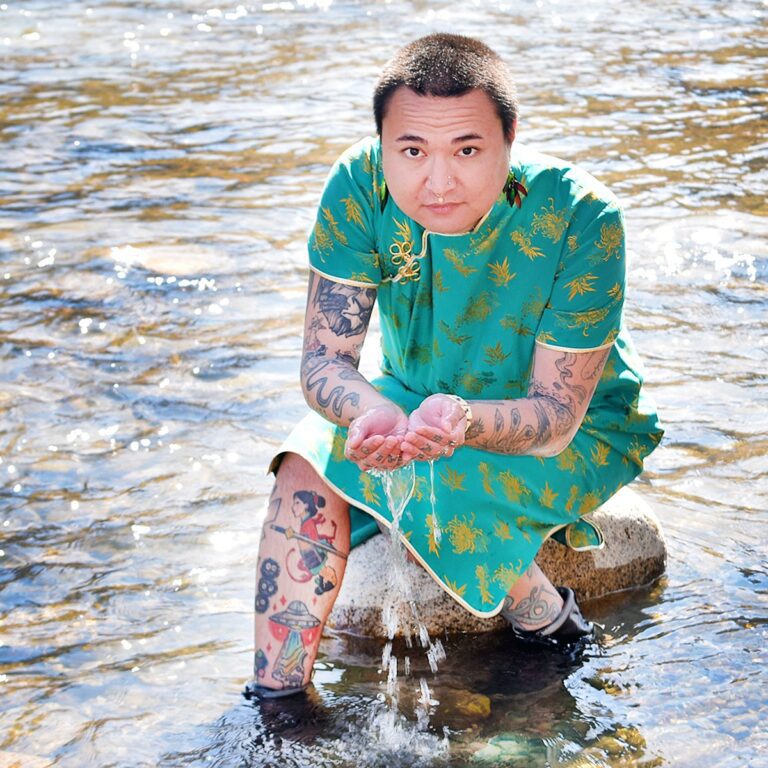Dani Putney’s Upcoming Poetry Collection Explores Identity and Heritage
Dani Putney, a mixed-race Filipinx and non-binary poet, has announced the forthcoming release of their second full-length poetry collection titled Mix-Mix, which is set to be published by Baobab Press on April 8. Born in the United States and raised in both Sacramento and Fernley, Putney’s work serves as a deep exploration of personal and collective histories, addressing themes such as heritage, colonialism, and the quest for identity.
Background and Personal Narrative
Putney’s familial background is marked by significant cultural contrasts; their father, a white American, married their mother, a Filipina mail-order bride, in a union distinguished by a notable age difference of 33 years.
Reflecting on their upbringing, Putney expressed feelings of displacement tied to their mixed heritage and the lack of access to their mother’s native languages. “My dad forbade her from teaching my brother and me Tagalog, because he wanted us to be more American,” they remarked.
Thematic Elements in the Poetry Collection
In the opening poem, “Heritage,” Putney contemplates the intricate relationship between home and colonialism, stating that “home only makes sense if I say colonialism.” Throughout the collection, they navigate the complexities of identity, expressing a unique narrative that skillfully interweaves their experiences as a person grappling with both masculinity and femininity.
In “Ani-mimetic Body,” they articulate the dualities of gender and self: “can’t separate the urge to fuck / & to become” and “laws of nature disappear to align / my flat chest with spiked rose … .” In a broader reflection, Putney asserts, “no, I’m yellow & more yellow, / infinity in the cosmos of my marrow,” highlighting their distinctive perspective on their layered identity.
Title and Cultural Symbols
The title Mix-Mix takes inspiration from halo-halo, a traditional Filipino dessert, which symbolizes Putney’s intersectional identity—“I see myself in the cup’s crushed / ice, scattered like islands / throughout an archipelago.” This connection to food is particularly poignant as it represents the sole thread to their Filipino heritage in their early life, offering a means to delve into their personal and cultural narrative intertwined with the broader implications of imperialism.
Documentary Style and Historical References
A significant portion of Mix-Mix is dedicated to a series of documentary-style poems titled “Footnotes to Marriage by Correspondence” and “Asian Romance Guide to Marriage by Correspondence.” The latter takes its name from a 1989 guidebook aimed at American men seeking mail-order brides.
Putney discovered this guidebook after their father’s passing in 2016, finding it filled with personal notes and financial notations that painted a picture of their father’s intentions. The collection features letters from American men reaching out to prospective Filipino brides, encapsulating the complex dynamics of these relationships. One such letter from a Californian dentist expresses the desire for companionship, emphasizing domestic roles.
Personal and Historical Interplay
The poems leverage a quasi-documentary approach, where approximately 25% comprises found materials. Putney’s academic background in Filipino-American poetics and art history informs their approach, allowing them to conflate personal experiences with historical narratives. Poems in the “List of Illustrations” segment utilize empty boxes and captions akin to museum labels, underscoring the historical and personal voids in Putney’s upbringing.
Engagement with Historical Reaction and Sexuality
The collection critiques the fetishization of Asian women, which appears throughout in various contexts, including discussions of power dynamics and the implications of desire. “It’s never about the actual sex,” Putney articulates, “Rather, it’s about everything around the sex—power dynamics, internal struggles.”
Essays and Self-Reflection
Another pivotal element of the collection is “Multitude,” a personal essay that interjects the poetry and examines Putney’s relationship with their father—a figure associated with emotional abuse. Their contemplation of this complex relationship leads to insights about their own queerness and sexual identity. The essay also explores literary figures like Walt Whitman and Allen Ginsberg, weaving them into a narrative that addresses personal trauma and discovery.
Empowerment and Future Readings
Ultimately, Putney’s journey through Mix-Mix becomes one of transformation and empowerment. They reclaim their narrative by embracing their non-binary identity and rejecting cycles of harm, asserting, “I refused to grow up, so I became non-binary. As a not-man, I avoid replicating my dad’s abuse. Instead of wielding violence, I transform it into cosmic energy.”
Readers interested in experiencing Putney’s work can attend a reading event at Mountain Music Parlor in Reno on April 24 at 6:30 p.m., where copies of Mix-Mix will be available for purchase.


